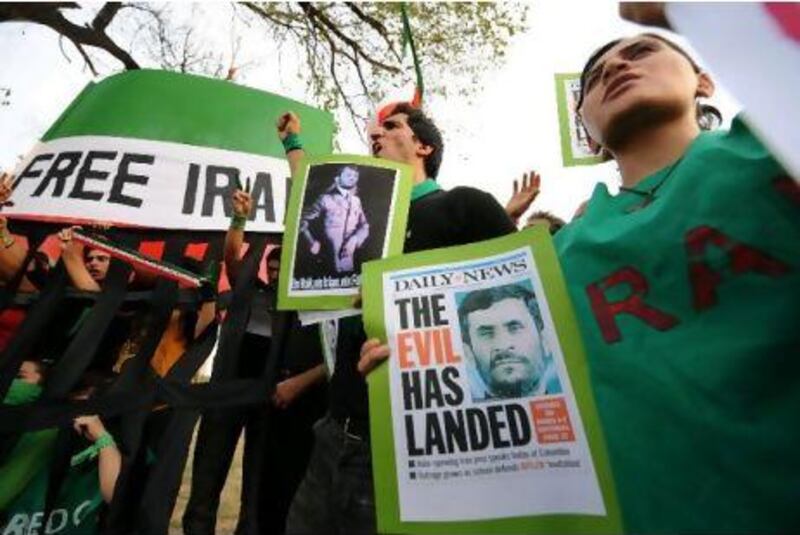The government of President Mahmoud Ahmadinejad and its supporters are gleefully portraying the momentous protests convulsing parts of the Arab world as a defining, revolutionary struggle against "despotic", secular western "puppets". It also claims the demonstrators are inspired by Iran's 1979 Islamic Revolution that toppled the US-backed Shah.
These assertions, made repeatedly in the state-run media, overlook inconvenient truths.
One is that most of those protesting in Egypt, Tunisia, Jordan and Yemen were not born when Iran's revolution sent shock waves across the region and beyond. Another is that many are demanding the same rights and liberties that the Iranian regime denies its own people.
Iran's state-run television has manoeuvred uncomfortably to cover the tumultuous events sweeping parts of the Arab world. It has shown Egyptian protesters chanting "Allahu Akbar" - God is greatest - but edited out scenes of baton-wielding riot police cracking heads. Such footage would have resonated widely with the hundreds of thousands of Iranians who took to the streets with great hope in 2009.
An analyst in Tehran, speaking on condition of anonymity, said: "Obviously, the regime doesn't want people to be inspired by the protests in the way that Egyptians were inspired by Tunisians. Batons hitting heads evoke certain memories," he added dryly.
The reaction of Tehran to protests in Egypt and elsewhere in the Arab world is also notable for its insistence that the demonstrations represent a victory for Islamist groups.
On influential, hardline Iranian cleric, Ayatollah Taqi Mesbah-Yazdi, said last week: "Today, as a result of the gifts of the Islamic Revolution in Iran, freedom-loving Islamic peoples [in] Tunisia, Egypt and nearby Arab countries are standing up to their oppressive governments."
Ahmed Khatami, a hardline prayer leader in Tehran, agreed: "To those who do not see the realities, I clarify that an Islamic Middle East is being created based on Islam, religion and democracy with prevailing religious principles."
In fact, Islamist groups were not at the forefront of the demonstrations that toppled the Tunisian president, Zine El Abidine Ben Ali. In Egypt, the banned Muslim Brotherhood joined in demonstrations only last Friday.
Rather than viewing Iran as a model, many of the Arab world's Islamists look to Turkey, where the moderate, Islamist-rooted ruling party has increased democratic participation, strengthened the country's international standing and improved the economy.
Even so, Iran's hardliners are clearly hopeful that grass-roots Islamist groups in the Arab world will soon stake their claim and head any new governments that may emerge, while steering their countries out of the "hegemonic" orbit o the United States.
They are encouraged by what they see as recent Iranian gains in the region, despite US attempts to isolate Iran and international sanctions imposed because of Tehran's nuclear programme.
This month, Tehran's ally in Lebanon, Hizbollah, brought down the US-backed government of Saad Hariri.
Iran's hardliners are particularly excited by the possibility that Egypt's president, Hosni Mubarak, will have the same fate as the Shah. They deride Mr Mubarak as an ossified "pharaoh" who has taken US aid in return for guaranteeing his country's unpopular 1979 peace treaty with the "Zionist entity", Israel.
The view from Iran is far from monolithic, though. Iran's opposition "green movement" is also cheering on Egyptian protesters, but from a pole apart to that of their "illegitimate" government.
Iran's main opposition leader, Mir Hossein Mousavi, argued this weekend that protesters in the Arab world were inspired by the huge pro-democracy demonstrations that shook the Iranian regime after Mr Ahmadinejad's re-election in 2009 in what many Iranians consider a fraudulent ballot.
"Whatever we are witnessing in the streets of Tunis, Sana'a, Cairo, Alexandria and Suez take their origins from the millions-strong protests in Tehran in June 2009," Mr Mousavi said in a statement on Saturday.
Supporters of Iran's opposition "green movement", meanwhile, are using the internet to cheer on Egyptian protesters. One activist posted on Facebook a picture of Mr Ben Ali alongside that of Iran's supreme leader, Ayatollah Ali Khamenei, with the message: "Dictators must go."





